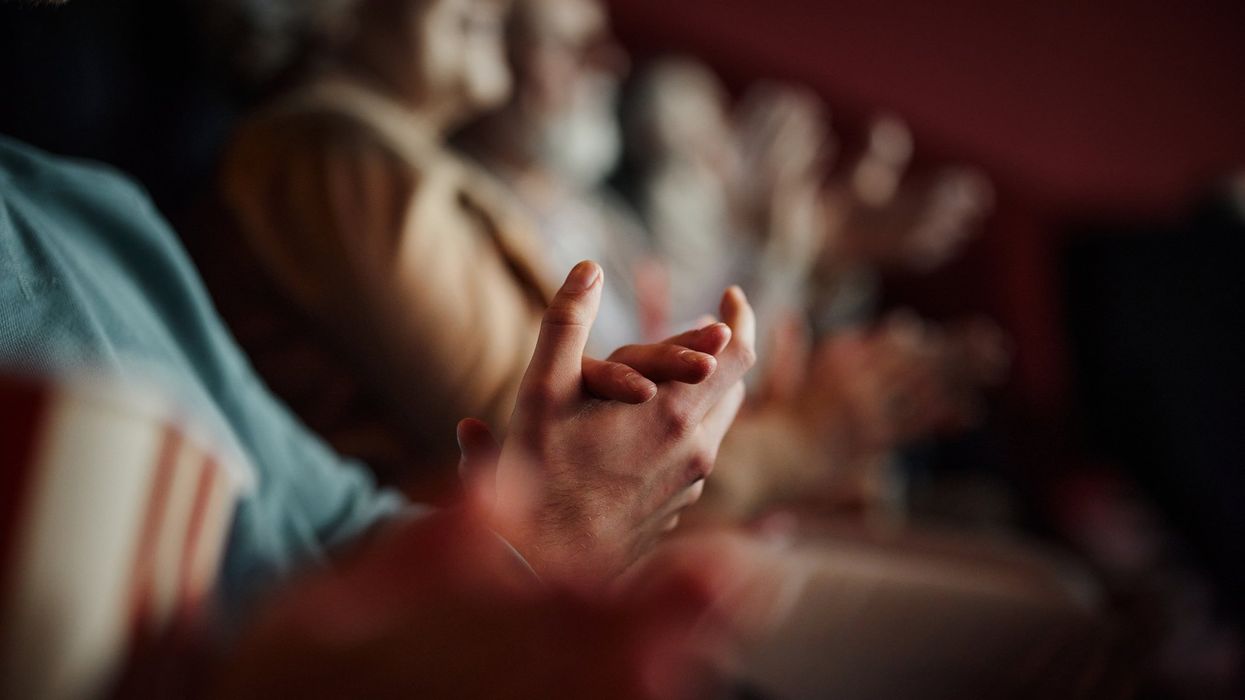Entertainment has been used for decades to improve attitudes toward other groups, both in the U.S. and abroad. One can think of movies like Guess Who's Coming to Dinner, helping change attitudes toward Black Americans, or TV shows like Rosanne, helping humanize the White working class. Efforts internationally show that media can sometimes improve attitudes toward two groups concurrently.
Substantial research shows that Americans now hold overly negative views of those across the political spectrum. Let's now learn from decades of experience using entertainment to improve attitudes of those in other groups—but also from counter-examples that have reinforced stereotypes and whose techniques should generally be avoided—in order to improve attitudes toward fellow Americans across politics. This entertainment can allow Americans across the political spectrum to have more accurate views of each other while realizing that successful cross-ideological friendships and collaborations are possible.
In this article, we document a brief history of entertainment used to improve the attitudes of other groups (along with some misfires, including when trying to portray White, working-class men). We then highlight those in the Arts and a few organizations including our own, More Like US, working to use entertainment to reduce perceived U.S. political divides. Despite promising initial work, many more groups and individuals are needed to contribute across many entertainment platforms.
Numerous successful U.S. entertainment efforts to improve attitudes toward groups with little historical power
Since the development of American mass media culture in the mid-20th century, allowing most Americans access to the same media, numerous examples of entertainment media have tried to improve attitudes towards those who have traditionally held little power. In this case, we mean any group other than straight, white men. This said, some entertainment media reinforced stereotypes, but at least there are many fairly successful examples that challenged stereotypes and likely changed attitudes among many in the American public.
This is perhaps most evident in the work of screenwriter Norman Lear, who was instrumental in improving misperceptions of these traditionally less-powerful groups, specifically women and Black Americans. Maude was centered around a woman, unique for sitcoms in the 1970s, and portrayed Maude as opinionated, strongly advocating for women’s liberation and civil rights, dispelling notions that women could not be politically involved or opinionated. Additionally, The Jeffersons, another Norman Lear sitcom from a similar era (1975-1985), was revolutionary in portraying a Black family as wealthy business owners, helping dispel common negative stereotypes of Black Americans.
Another example goes farther back in time to WWII. Beginning with a 1942 song, the Rosie the Riveter propaganda campaign, mainly remembered for its posters, worked to dispel notions that women could only be homemakers. Through its portrayal of Rosie, this campaign encouraged women to take part in the war effort in less traditionally feminine roles such as factory work.
In the late 1960s, Guess Who’s Coming to Dinner portrayed an interracial couple in a positive light, at a time when only around 20% of Americans approved of interracial relationships and there was significant stigma around the presence of Black Americans in “White” society.
Will & Grace, a sitcom that began airing shortly before the turn of the 21st century, was deeply impactful on a different front. The show’s portrayal of Will as a gay man who seemed relatable and non-threatening helped to improve negative perceptions of gay men in contemporary America. Straight viewers without contact with gay people in real life saw straight characters positively interact with gay characters. As a result, 60% of viewers reported that “watching the show led to positive perceptions of gay people,” and 71% of viewers rejected the statement that “heterosexual relationships are the only ‘normal’ relationships,” compared with 45% of non-viewers, according to research cited by Bridge Entertainment Labs.
More recently, Marvel’s Black Panther franchise is notable for its unique portrayal of a Black society that was incredibly wealthy, powerful, and technologically advanced. The TV show Modern Family (2009-2020), meanwhile, positively portrayed non-traditional families and members of the LGBTQ+ community, winning over 20 Emmys for its work.
Despite all these generally positive portrayals of groups who have historically held less power, it would be a stretch to say that these groups have always been portrayed well or sufficiently. A reality show like Cops or scripted shows like The Wire often showed ethnically minority men as criminals, and movements like #OscarsSoWhite showed that non-White representation on film proceeded fairly slowly.
But thankfully, there are many portrayals in entertainment of historically less powerful communities that challenge dangerous misperceptions and help create more positive views of them.
Entertainment portrayals of white, working-class men have been pretty bad, though not uniformly terrible
In addition to looking at portrayals of groups historically without much power, we analyze portrayals of those historically with power, namely straight, white men. Because this is such a broad category, and we care about politics, we focus our attention on working-class white men. This group is defined as those without a college degree, often portrayed as working blue-collar jobs. According to 2024 NBC exit polls in 10 key states, white men without a college degree voted for Trump over Harris 69% to 29%, representing almost a fifth of the electorate in those states.
Many of these portrayals also inaccurately represent members of this traditionally more powerful group (though many in this group have experienced and/or felt loss of economic power and social status in recent decades). American media has consistently not been sufficient in portraying the struggles and humanity of working-class white men.
A clear example of this comes from a screenwriter praised earlier in this piece, Norman Lear. All in The Family (1971-1979) is one of the most well-known sitcoms of all time. Yet the main character, Archie Bunker, while humanized to some extent, is portrayed as uneducated and stereotypically bigoted, creating a mostly unflattering and one-sided picture of working-class white men.
Thinking of the cartoon sitcom The Simpsons, which is still running after more than 35 years, Homer never went to college, and he is largely portrayed as a stupid oaf, with infrequent bright spots in his character. On the same show, Cletus is portrayed even worse as a “slack-jawed yokel.”
A variety of reality shows do portray white, working-class men, but usually more as rural or brawny stereotypes than particularly well-rounded characters. This includes the Robertson family from Duck Dynasty (2012-2017) or those in reality shows including Ice Road Truckers (2007-2017) and the ongoing 20-year run of Deadliest Catch about Alaskan crab fishermen.
One of the few arguable bright spots in terms of portrayals of white, working-class men just went off the air. The character of blue-collar Dan Conner first appeared as the male lead in the TV show Roseanne (1988-1997) and then its spin-off The Conners, which aired its last episode in April after seven years on broadcast TV. Negative stereotypes are distinctly less pronounced in Dan Conner than in All in the Family’s Archie Bunker. Dan is portrayed as relatively traditional and hesitant about social change in both the original show and its spinoff, but he also shows vulnerability and commitment to family life in many cases, challenging some stereotypes of white, working-class men. Writer and Executive Producer of The Conners Dave Caplan has thought deeply about the importance of portrayals in entertainment and even has a graduate degree in media psychology.
In all, while sometimes functioning to humanize working-class white men, much entertainment misrepresents working-class white men as overwhelmingly bigoted and/or unintelligent in basically anything other than blue-collar skills, perpetuating harmful stereotypes. This largely has the opposite effect of many of the shows noted earlier in the article, many of which actively work to correct harmful stereotypes of those with traditionally less power.
International efforts show how attitudes toward two groups can be improved simultaneously
There does not need to be a negative portrayal of one group to create positive portrayals of another group. This is apparent in international efforts to improve negative portrayals of certain demographics.
One example is Radio La Benevolencija (RLB), which has worked in various countries, especially in Africa. We will focus on its work in Rwanda, which was created to reconcile differences, heal from the Rwandan Genocide, and prevent another genocide from happening. The programs within the project were created to be entertaining but informative and appeal to a wide variety of audiences.
In RLB’s main Rwandan program, New Dawn, two communities directly paralleling the Hutus and Tutsis lived side by side and were in conflict over a land shortage. The show directly parallels the lead-up to the genocide, as well as the aftermath, without directly referencing the genocide.
In a research paper on RLB, Elizabeth Levy Paluck argued that the program “did not change listeners’ personal beliefs but did substantially influence listeners’ perceptions of social norms.” These norms actually influenced behavior, as listeners changed their behaviors in terms of “active negotiation, open expression about sensitive topics, and cooperation.”
Radio La Benevolencija has made significant strides in healing misperceptions of different ethnic groups, proving the effectiveness of entertainment in concurrently reducing harmful stereotypes of more than one group. Another organization, Search for Common Ground, also has pursued similar efforts in countries including Yemen, Sierra Leone, and Nepal.
Current initial efforts to use entertainment to improve cross-partisan attitudes in the U.S.
To a certain extent, entertainment is already being used to reduce political misperceptions and subsequent divides in the U.S. An upcoming romantic comedy, The Elephant in The Room, tells the story of a progressive and a Trump supporter who try to bridge the gap between their worldviews as they date.
There is also an abundance of short-form content with this aim. In the YouTube video “Cats, Anyone? Finding What We Have in Common When Ideology Divides Us” from NationSwell, two Americans of opposing political viewpoints bond over a shared love for cats. And in the Heineken advertisement “Worlds Apart,” people with contradictory views on different topics find common ground before discussing their differences over a shared beer.
Several organizations are also using entertainment to bridge the gap between those of different viewpoints. Bridge Entertainment Labs, cited earlier for their research into the connection between entertainment media and misperceptions, is working to tell the stories of real Americans of a wide variety of backgrounds in order to contribute to national unity and create a sense of connections between Americans of different political affiliations. The work of Bridge Entertainment Labs, specifically in its whitepaper, aligns closely with the claims made in this article.
PopShift works with major Hollywood studios to connect producers and writers with experts in order to facilitate more accurate representations of those of diverse backgrounds and reduce misperceptions towards certain groups of Americans. Part of the work of Resetting the Table involves training those in Hollywood to have storylines with characters that have “investigated their differences openly and come out the other side,” using tools most influenced by Transformative Mediation, in order to ultimately create a more cohesive America. Braver Angels Music, meanwhile, trains songwriters and musicians to write songs that can bridge political divides, while also providing a space for songwriters to develop material and get to know each other.
The organizations listed above do essential work in bridging the gap between the perceptions Americans hold of those of different political affiliations and the true situations and beliefs of Americans of varying political affiliations. This work aligns with our organization’s, More Like US, initiative to re-CAST fellow Americans in a positive light as more complex, admirable, similar, and worthy of togetherness than expected.
Nevertheless, these efforts are currently small and scattered. Much more of this work is needed in such a large country as the U.S. In today’s decentralized and balkanized media environment, content that improves attitudes toward each other across politics needs to appear not only in TV and movies but in all sorts of entertainment, including social media videos, music, books, plays, and visual art.
Conclusion: Let’s learn from history to create entertainment that improves attitudes of each other across politics
There is a long history of entertainment being used to correct misperceptions of groups that have historically held less power. Entertainment media has proven time and time again its capacity to debunk harmful stereotypes and bridge gaps between people of different backgrounds. Entertainment has unfortunately also reinforced or exacerbated stereotypes in many cases, but these instances can be used as counter-examples of what to generally avoid going forward.
This history serves as an essential guide to fixing modern problems. Americans hold exaggerated negative views of those of different political affiliations. Entertainment media is essential in closing the gap between the truth and these exaggerated negative views. Initial efforts are going in the right direction, but many more people across many entertainment mediums need to create vastly more content. By correcting misperceptions and promoting connection and collaboration between those of different viewpoints, entertainment has the potential to reduce perceived partisan divides and create a more unified America.
James Coan is the co-founder and executive director of More Like US. Coan can be contacted at James@morelikeus.org
Sara Weinstein is a current intern at More Like US.


















 Senate Committee on Commerce, Science, and Transportation ranking member Sen. Maria Cantwell (D-WA) (R) questions witnesses during a hearing in the Russell Senate Office Building on Capitol Hill on February 10, 2026 in Washington, DC. The hearing explored the proposed $3.5 billion acquisition of Tegna Inc. by Nexstar Media Group, which would create the largest regional TV station operator in the United States. (Photo by Chip Somodevilla/Getty Images)
Senate Committee on Commerce, Science, and Transportation ranking member Sen. Maria Cantwell (D-WA) (R) questions witnesses during a hearing in the Russell Senate Office Building on Capitol Hill on February 10, 2026 in Washington, DC. The hearing explored the proposed $3.5 billion acquisition of Tegna Inc. by Nexstar Media Group, which would create the largest regional TV station operator in the United States. (Photo by Chip Somodevilla/Getty Images)
